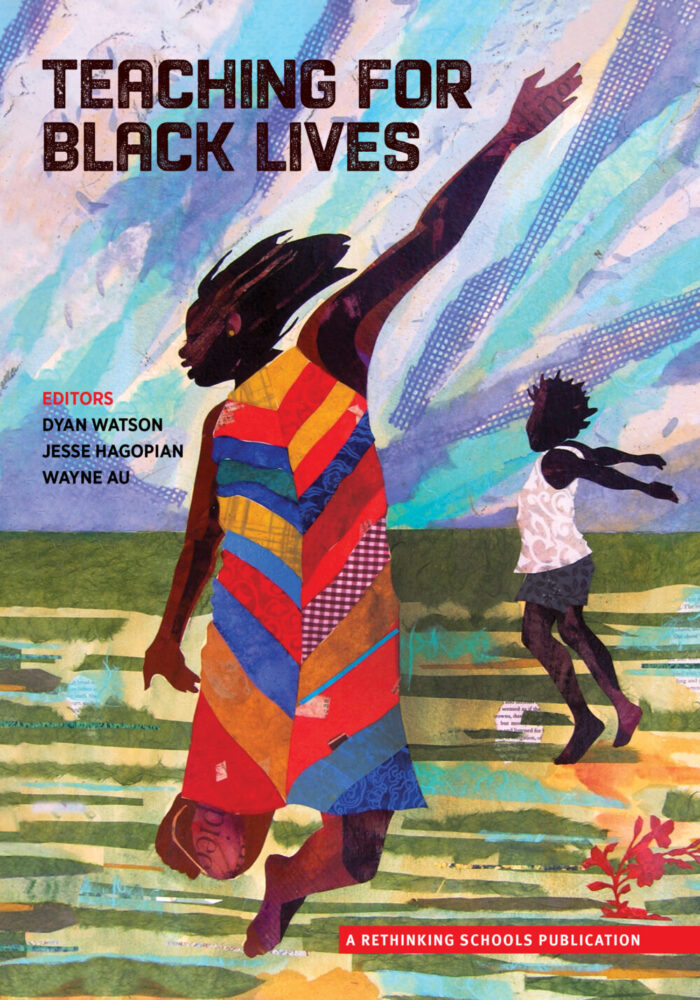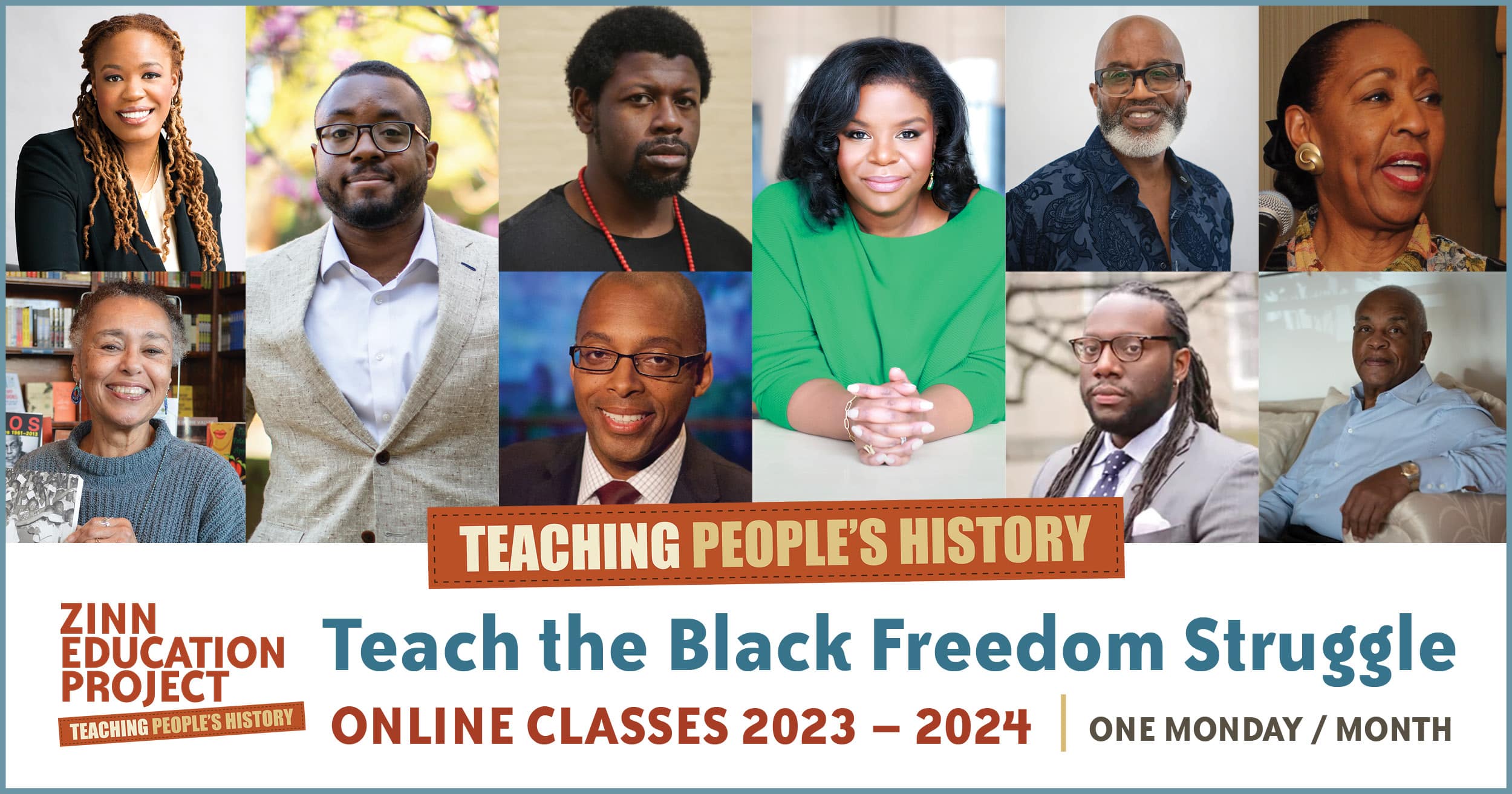Each year the Zinn Education Project hosts Teaching for Black Lives study groups across the United States. Using the Rethinking Schools book Teaching for Black Lives, teachers explore how to teach about racism, resistance, and joy. They are a free, teacher-led professional learning community that can be tailored to the conditions in each school or district.
Check out this three-minute video on the Teaching for Black Lives campaign.
My ideas about the narrative of our country have changed and I am motivated to educate myself about what I didn’t learn in history class so I can better teach my students.
Another wrote:
It was one of the few things I took on this year that added to my resilience, to my sense of community, to my energy to keep going and do the work. The support that came as we worked together was and is invaluable.
Benefits
Thanks to the support of donors, each study group receives:
- Teaching for Black Lives book for each participant (up to 20) and Teaching for Black Lives study guide
- Rethinking Schools subscription for each participant (up to 20)
- Introductory workshop featuring one or more editors of Teaching for Black Lives
- Access to several invitation-only webinars and workshops (panel discussions on current events, curriculum workshops, campaign planning)
- Closing event featuring one or more editors of Teaching for Black Lives
- Access to a network of other teacher study groups across the United States
- Dedicated support for the study group coordinators
The number of study group applications we accept depends on our funding for the respective year. To date, we have averaged 100 study groups per year.
Goals
The goal is for study groups to focus their study and practice on one or more of the teaching for Black lives themes below.
- Centering Black joy in the classroom, not just oppression
- Deconstructing master narratives in the curriculum and teaching people’s history
- Exploring intersectionality
- Identifying and addressing the structural impact of racism at the school level (such as school discipline, staffing, course offerings)
- Identifying and addressing the structural issues of racism at the district level (such as grading policies, dress code, curriculum)
Format Suggestions
The structure and format can vary (see suggestions below) according to the goals of the group. Each group can adapt and/or combine these ideas to create a plan that is just-right for them.
School- or district-based book study
Regular meetings to discuss chapters and create individual and/or collective action plans around each of the book’s five sections.
Examples from the 2021-22 school year:
-
- The Melrose Public Schools (Mass.) study group met once a month virtually for an hour and half with reading and assignments in between. Check out their overview.
- The Nashville study group met three times a month, with in-person and virtual options. They created a weekly schedule with sections of the Teaching for Black Lives study guide. They were inspired by the chapter on poetry to implement more poetry reading and writing into their curriculum framework to spark creativity, a love of reading, and to work on writing.
- The Pullman (Wash.) study group was inspired by national discussions around Confederate monuments and statues. They organized to change the name of an elementary school where three study group members work. They were also in conversation with the local public library about a large Jefferson painting near its entrance.
- The Bel Air (Md.) teachers’ union study group published a special edition of their union’s newsletter. Two study group members wrote editorials, they have several book reviews, exemplar lessons, and book suggestions.
- The Baltimore study group discussed how anti-racism should inform grading practices, uniform policies, and approaches to restorative justice and education.
- Steppingstones Academy (Phila.) study group is transforming their behavior management and practicing restorative justice that is informed from Section 4 of Teaching for Black Lives. They created worksheets that encourage students to reflect on their feelings during a challenging situation and understand how other students feel. They also changed their policy to no longer require students to walk in a line between classes.
- The Hamden study group included teachers, teacher assistants, behavior techs, and guidance counselors. In each session they used a different discussion protocol to bring the strategies back to their classrooms.
Curriculum work
Convene a group of educators to work on designing a course, unit of study, or curricular framework that “teaches for Black lives.” Use the book as an analytic framework and some of its lessons as models for their own work.
Example from 2021-22:
-
- The Rochester study group created an educational newsletter with Black & Bilingual Teaching and Learning Resources. Some of their ongoing projects include examining book collections, offering workshops on gender and racism, and creating a curriculum for teaching local Black history all year long.
- A Brooklyn study group dedicated efforts to complete a unit of study for each subject area that is based on specific sections of the Teaching for Black Lives book.
Visioning and professional development
Host a study group of school leaders to inform their school’s vision for the future and plans for professional development for their school and/or district.
Examples from 2021-22:
-
- The Los Angeles study group created a Nearpod PD presentation on anti-racist teaching to share across their district.
- The Portland (Ore.) study group of early childhood educators assessed their home visiting questions to make them more culturally relevant. They also examined their rubric for quality diverse children’s picture books in order to select and prune their classroom libraries. They selected books to create lessons on identity and a sense of belonging to share with colleagues.
Participate in Black Lives Matter at School
Use the book to guide a working group committed to building toward or upon a school or district’s participation in the Black Lives Matter at School’s Year of Purpose and Week of Action.
Example from 2021-2022:
-
- The study group hosted by the Mesa Education Association in Arizona created a resource document for the members of the Association to support Black Lives Matter at School Week of Action.
The ideas above are suggestions. We welcome other proposals with other ideas and formats.
Study Group Expectations
Before applying, group coordinators are asked to consider the following expectations.
- The group has a clear connection to K-12 education.
- The coordinator is willing to be responsive and timely in providing our office staff the names, emails, and addresses of all group members to facilitate shipping of books and magazine subscriptions.
- Hold regular (a minimum of five) meetings based on a collective reading of Teaching for Black Lives and a recent issue of Rethinking Schools magazine.
- Provide the Zinn Education Project at least three updates (after first convening, mid-year, end of year) on your study group’s work using a survey we will provide.
- If possible, share photos, videos, and other artifacts that reflect the group’s work.
- All study group members will attend at least three invitation-only events, including the national welcoming event and closing event (with options).
- Complete an end-of-year evaluation.
Teaching for Black Lives Campaign
The study groups are part of a larger campaign that also includes:
- free lessons for K–12 school classrooms
- the Rethinking Schools book, Teaching for Black Lives
- online classes with Black Freedom Struggle historians
- curriculum workshops
- advocacy and organizing to defend teachers
Applications for 2022-2023 study groups are closed.
Sign-up below to be notified when applications are available for the 2023-2024 school year.








Twitter
Google plus
LinkedIn